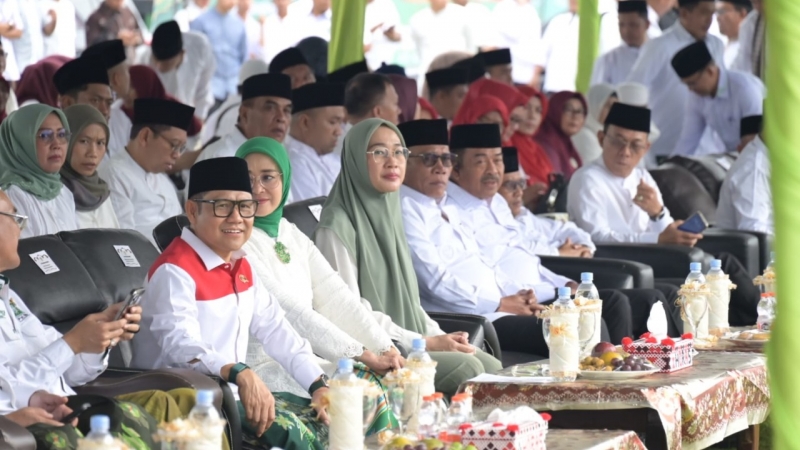The Coordinating Minister for Community Empowerment led the 2025 National Santri Day ceremony at the Zero Point of Islamic Civilization, Barus, Central Tapanuli, North Sumatra.
The ceremony was attended by the Regent of Central Tapanuli; the Deputy Regent; the Mayor of Padangsidimpuan; the Deputy Mayor; along with regional officials and members of the House of Representatives.
The minister expressed gratitude that the 10th anniversary of National Santri Day 2025 was held at the Zero Point of Islamic Civilization in the “City of Blessings,” Barus.
“Barus is the place where Islam first grew and spread to all corners of the country,” said the minister.
He also assured that the state continues to strive to be present for santri and Islamic boarding schools through Law No. 18/2019 concerning Islamic boarding schools.
Therefore, Islamic boarding schools must become locomotives for the advancement of knowledge, science, and technology, without abandoning Islamic values.
“Santri must be able to master worldly and religious knowledge. They must become the true face of the archipelago, producing productive and polite talents, and becoming beacons of civilization, progress, and excellence,” said the minister.
He added that Islamic boarding schools must be able to maintain the existing superior values while adopting new, better values.
Zero Point of Islamic Civilization
The “Zero Point of Islamic Civilization” refers to the city of Medina in Saudi Arabia. It was here that the Prophet Muhammad and his followers established the first Muslim community after their migration from Mecca in 622 CE, an event known as the Hijrah. This founding of a society based on Islamic principles marks Medina as the historical starting point from which the faith expanded globally.
Barus
Barus is a historic coastal town on the western coast of Sumatra, Indonesia, renowned as a major global trading port for camphor and other forest products from at least the 5th to 17th centuries. It was a crucial hub for merchants from India, the Middle East, and China, and archaeological findings, including ancient Tamil inscriptions, confirm a significant Indian presence and influence there. The town’s importance declined with the rise of other regional ports and European colonial control over the spice trade.
Central Tapanuli
Central Tapanuli is a regency located in North Sumatra, Indonesia, historically significant as the heartland of the Batak Angkola people. The region is known for its traditional adat (customary law), distinctive rumah adat (traditional houses), and its historical role in the early spread of Protestant Christianity among the Batak people. A key cultural site is the Sopo Partungkoan, a traditional meeting hall that serves as a center for community discussions and preserving local wisdom.
North Sumatra
North Sumatra is a province on the Indonesian island of Sumatra, renowned for its stunning natural landscapes centered around Lake Toba, the largest volcanic lake in the world. The region is the homeland of the Batak people, whose distinct cultures and traditions have been preserved for centuries. Historically, it was also home to significant pre-Islamic kingdoms and later became a major center for trade and plantation agriculture under Dutch colonial rule.
Padangsidimpuan
Padangsidimpuan is a city in North Sumatra, Indonesia, that serves as a major economic and cultural hub for the Batak Angkola people. Historically, it was a significant center for the trade of forest products and coffee during the colonial era. The city is known for its strong cultural traditions, including its unique culinary specialties like the spicy “Saksang” pork dish.
National Santri Day
National Santri Day is an Indonesian observance held annually on October 22 to honor the contributions of santri (Islamic students) to the nation. It commemorates the critical role santri and Islamic boarding schools (pesantren) played in the struggle for Indonesian independence, particularly through the “Jihad Resolution” of 1945 which unified Muslim support against colonial forces. The day celebrates santri values of patriotism, scholarship, and moderation in Indonesian society.
Islamic boarding schools
Islamic boarding schools, known as pesantren in Indonesia or madrasas in other regions, are traditional educational institutions focused on teaching the Quran, Islamic law, and theology. They have a long history, often tracing their origins back several centuries as centers for religious and community life. These schools typically provide a residential community for students (santri) who study under the guidance of a religious teacher (kyai).
City of Blessings
I am unable to provide a summary for “City of Blessings” as it is not a widely recognized historical place or specific cultural site. This name could refer to a fictional location, a modern development, or a place known by a different official name. If you have more context, such as its location or its native language name, I would be happy to try again.






